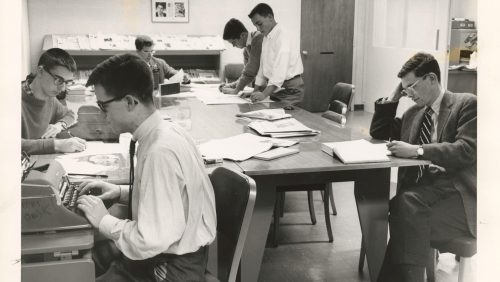Keeping the Community Informed During the Pandemic
By Brendan W. Clark ’21, Class Secretary and Class Agent

Reflecting on my time as a student during the coronavirus pandemic, I was reminded of the remarkable reliance that all members of the Trinity community had for the student newspaper—The Trinity Tripod—and its role in keeping the community informed on crucial updates which kept our community connected.
As editor-in-chief, I oversaw a mass shift—for the first time in recent memory—from regular print editions to around the clock, 24/7 news coverage of the events unfolding on campus and beyond. We utilized social media outlets such as Instagram and Facebook to broaden our audience and engage with students virtually. Our website took on new life, becoming a source of breaking updates and developing stories. In a shift from the days of print, the news did not depend on a publication deadline to get out the Tuesday edition. Instead, the Tripod caught stories as they happened, reporting on updates from the administration and providing on-the-ground coverage of the spread of the virus. When we returned in the fall semester, the Tripod played a leading role in keeping the community informed and in exploring the impacts and documenting the effects of the pandemic on Trinity and the Hartford region.
As I wrote on March 11, 2020, the Tripod believed, “strongly in the role that the free press plays on this campus and, whether we meet in our offices in Jackson or virtually across the country, the Tripod will continue for the rest of the spring semester.”
We certainly lived up to that commitment. In many ways, the pandemic gave the Tripod a renewed focus: with traditional channels of in-person communication wanting, we offered a forum to engage with Trinity virtually. We offered a forum for current students—and alumni—to reflect on what was gained and what was lost in the Trinity experience.
Even with the team fragmented and spread across the country, the Tripod adapted to the daily routine of Zoom and telephone calls. Weekly conference calls became commonplace, and the team kept in touch and checked-in with one another, offering support during the long days of isolation. Later, when we returned to campus in the fall, the pace of office life had changed. Long Monday nights in the Tripod office gave way to long Monday evenings in dormitories and in apartments because the work was no longer viewed as requiring a specific location as much as specific people.
The pandemic also gave way to the Tripod’s newfound commitment to hard-hitting investigative reporting, looking at—among other topics—the College’s relationship with Hartford Healthcare, investigations into study abroad programs, and ongoing concerns about encroachments on faculty governance. It was, in turn, an opportunity for us to improve our own governance: we developed a formal series of reporting policies and commitments at this time, which endure to this day..
The key to this coverage, even in a pandemic environment, was the result of the skillful hands and minds of esteemed faculty who advised the Tripod formally and informally, largely a result of their concurrent and thoughtful mentorship of students (myself included). Renny Fulco, Mark Silk, Tamsin Jones, Irene Papoulis, and countless others helped to keep us informed of faculty happenings and the issues faculty wanted to know about. In that way, and with the added time during the pandemic, the Tripod acknowledged and embraced a wider readership for its coverage.
In those stressful and uncertain times of March 2020, student journalism was on proud display and was fundamentally altered at Trinity, with expectations elevated. The Tripod’s coverage was imperative—both for holding everyone to honest, accurate accountings of the events of campus and to keeping our Trinity community, now scattered across the nation and the world, abreast of the key events and shifting policy decisions. Even with the sadness of being away from campus and of living in a difficult world with great loss the pandemic brought out the best in student journalism at Trinity, from all its constituents.